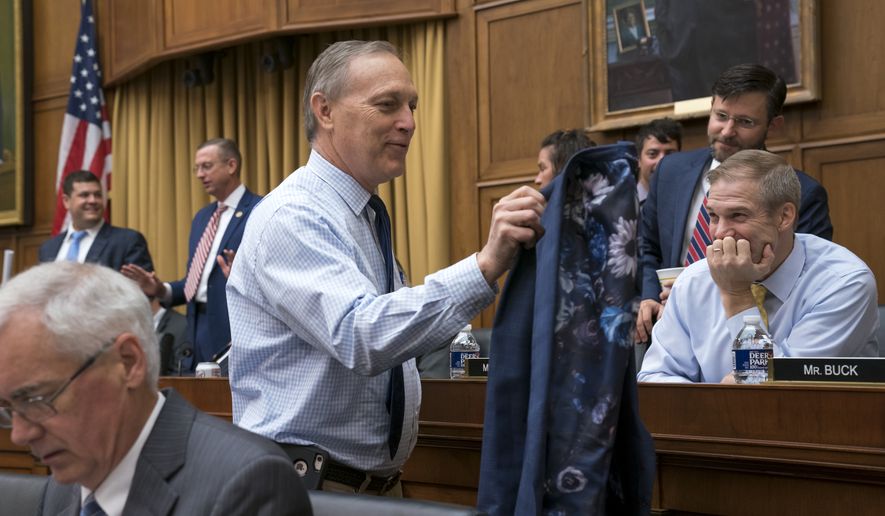The conservative House Freedom Caucus is home to President Trump’s most ardent fans but is not the “Trump Caucus,” the group’s new chairman declares.
Rep. Andy Biggs, the Arizona Republican who was elected this month to take the reins of the group of sometimes defiant hard-liners, said its members are not afraid to buck Mr. Trump as they did in opposing his attempt to repeal Obamacare in 2017.
“We took a stand and said, ’No, this is a bad deal.’ And we got the crap kicked out of us. And the president wasn’t happy with that,” Mr. Biggs told The Washington Times in a wide-ranging interview.
Though the Freedom Caucus has a reputation for rebelling against House Republican leadership, Mr. Biggs said the president knows the group will support him when push comes to shove.
He pointed to the fact that his members rallied around the president during the campaign season and have been his staunchest defenders in committee hearings that Democrats are using to investigate him on several fronts.
“The president trusts us because he knows that we look for every opportunity to defend him. I personally believe that is the right thing to do because you’ve got 90-plus percent of Republicans that approve of what he’s doing,” he said.
“So wherever we’re in agreement, we’re going to fight and defend,” he added.
One of the ways the Freedom Caucus has supported Mr. Trump is by defending the creative and lawsuit-inducing ways he has attempted to circumvent Congress and get the funds he needs to build his border wall.
Despite strongly railing against such unilateral actions as President Obama’s creation of the Deferred Action for Childhood Arrivals program, which granted amnesty to young illegal immigrants, Mr. Biggs said Mr. Trump is within his rights to act unilaterally because Congress has given up so much of its authority.
“If we don’t like it, then what we need to do is say, ’We’re taking back that authority.’ But we didn’t take back the authority,” he said. “OK, we don’t like it, Congress? You’d better act like Congress should.”
Some in Washington have compared the right-wing caucus to the group of four firebrand liberal congresswomen known as “The Squad” and the associated Congressional Progressive Caucus because of its reputation for unruly uprisings against party leaders.
Mr. Biggs didn’t agree with that comparison. He said Freedom Caucus members rely on playing by the rules to fight for their priorities.
“I think they’re using a bully pulpit or something like that far more than we do,” he said.
But the far-right caucus is closer to the president than to its chamber’s leadership, which it has irked on several occasions.
Not only did Freedom Caucus members derail the Obamacare fix, but they also bucked party leaders in June 2018 on immigration reform. They chided the leadership for not pushing for an enforcement-heavy option, though some of the more moderate members felt the caucus was moving the goal posts on negotiations.
“There’s a lot of traits and characteristics I admire of the Freedom Caucus sticking together, but honesty is just not one of them,” then-Rep. Jeff Denham, California Republican, said on MSNBC at the time.
Last year, Rep. Jim Jordan of Ohio, one of the founding members of the Freedom Caucus, challenged Rep. Kevin McCarthy, California Republican and the top lieutenant for Speaker Paul D. Ryan, for leadership of the party caucus. Mr. Jordan argued that party leadership had failed to make good on its campaign promises.
Now, though, Mr. Biggs is looking to turn a corner with party leadership as he aims to ensure the Freedom Caucus gets a say in not just procedures but also policy advancement.
He said his relationship with Mr. McCarthy is “under construction.” The Republican leader agreed to have regular meetings, leaving Mr. Biggs “hopeful and optimistic.”
“I’m a big believer that to be successful you keep your principles,” he said. “You also realize that you form coalitions, you work together where you can. And so we’ll see how this plays out.”
Part of that includes helping Republicans rally together for the 2020 elections.
Though the president is facing a primary challenge from a former Freedom Caucus member, Mark Sanford, Mr. Biggs doubts Mr. Trump has anything to worry about.
“It’s a gnat on the back of a water buffalo type of thing,” he said.
“The president is not overly concerned with him,” Mr. Biggs said. “You know Mark’s out there. It’s a chaotic type of effort. I don’t think it’s going to do anything.”
Mr. Biggs agreed with his friend’s focus on addressing fiscal issues such as the rising national debt but said it ultimately wouldn’t be able to make a dent in the president’s overwhelming popularity with the Republican base.
“Because if you’re a Never-Trumper, you’re still going to be a Never-Trumper. And if you’re a Trumper, you’re going to be a Trumper,” he said.
Mr. Biggs cautioned against trusting the “anti-Trump” polling data and said Republicans should focus on counting electoral votes rather than generic voters.
“That’s kind of what we were hearing last time in 2016, and it just didn’t materialize,” he said.
As for the House, Mr. Biggs said he is confident Republicans will win control in 2020. He said Democrats’ two-dozen-seat majority is built on districts they won by a combined 95,000 votes last year.
Republicans’ general plan is to zero in on 31 districts that the president won in 2016, 13 of which were held by more than 6 percentage points. Republicans hope the president’s popularity will help reverse the 2018 blue wave and help them secure the 19 seats they need to win the majority.
• Gabriella Muñoz can be reached at gmunoz@washingtontimes.com.




Please read our comment policy before commenting.